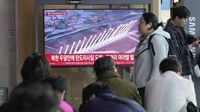On Thursday, May 8, 2025, North Korea fired several short-range ballistic missiles towards the Sea of Japan from launch bases in the city of Wonsan. This marked a significant moment as it was the first instance of ballistic missile firings by North Korea in nearly two months, with the last test occurring on March 10, 2025.
The South Korean military reported that it detected these projectiles around 8:10 AM local time (23:10 GMT on Wednesday, May 7, 2025). The military's Joint Chiefs of Staff confirmed that the missiles were presumed to be short-range ballistic missiles launched from the Wonsan region.
In the wake of the missile launches, South Korea, the United States, and Japan quickly established communication to share information regarding the nature of the missile tests. This rapid response underscores the ongoing tensions in the region, particularly given the history of military provocations from North Korea.
North Korea's recent missile launch is part of a broader effort to modernize its military arsenal and ballistic missile technology. This pursuit has been a consistent theme under the leadership of Kim Jong Un, who has emphasized the importance of strengthening the country's defense capabilities in the face of perceived threats.
On April 28, 2025, the North Korean navy unveiled a new destroyer named the "Choe Hyon," which is slated to enter service in early 2026. During the unveiling, test firings of cruise missiles were also conducted, emphasizing North Korea's commitment to enhancing its naval capabilities.
Kim Jong Un has been vocal about accelerating the country's nuclear armament, particularly within the navy, to safeguard the state and its maritime sovereignty against current and future threats. This directive reflects the ongoing militarization of North Korea, despite international sanctions imposed by the United Nations aimed at curbing its nuclear and ballistic missile programs.
The sanctions prohibit North Korea from possessing ballistic missiles, which typically travel outside the atmosphere during much of their flight path. However, such restrictions have not deterred North Korea from pursuing its military objectives. The country continues to develop and test various missile systems, which poses a growing concern for regional security.
The relationship between North Korea and South Korea remains fraught with tension, having deteriorated significantly in recent years. In fact, North Korea officially renounced any hopes of reunification last year, signaling a stark shift in its diplomatic posture. The two Koreas are still technically at war, as the conflict that erupted in 1950 concluded with an armistice rather than a formal peace treaty.
As the situation develops, analysts and military experts will be closely monitoring North Korea's activities, particularly its missile tests and military advancements. The implications of these actions extend beyond the Korean Peninsula, impacting regional stability and international relations.
In conclusion, North Korea's latest missile tests serve as a reminder of the persistent volatility in East Asia. With ongoing military developments and a complex geopolitical landscape, the international community continues to grapple with the challenges posed by North Korea's ambitions.




